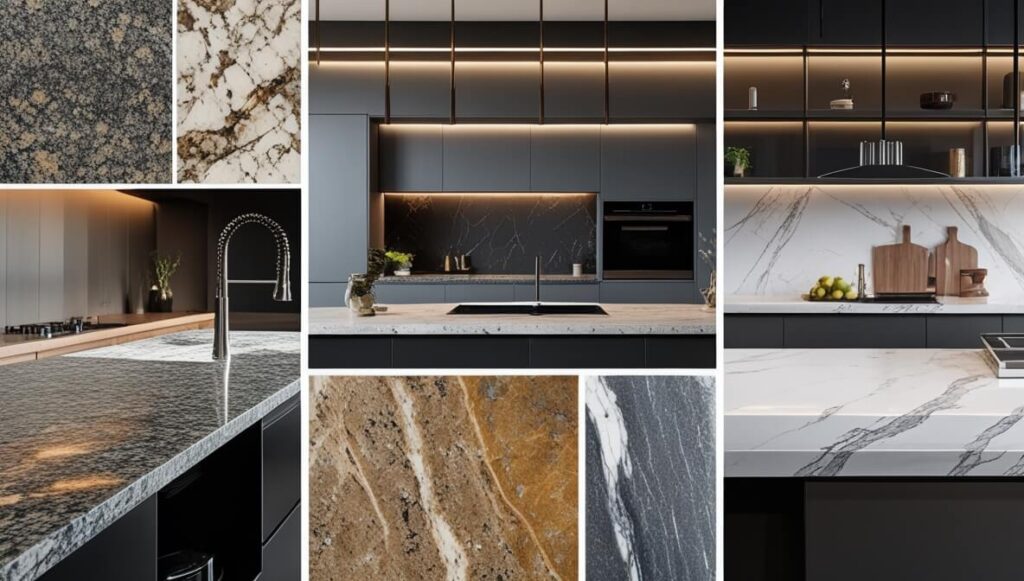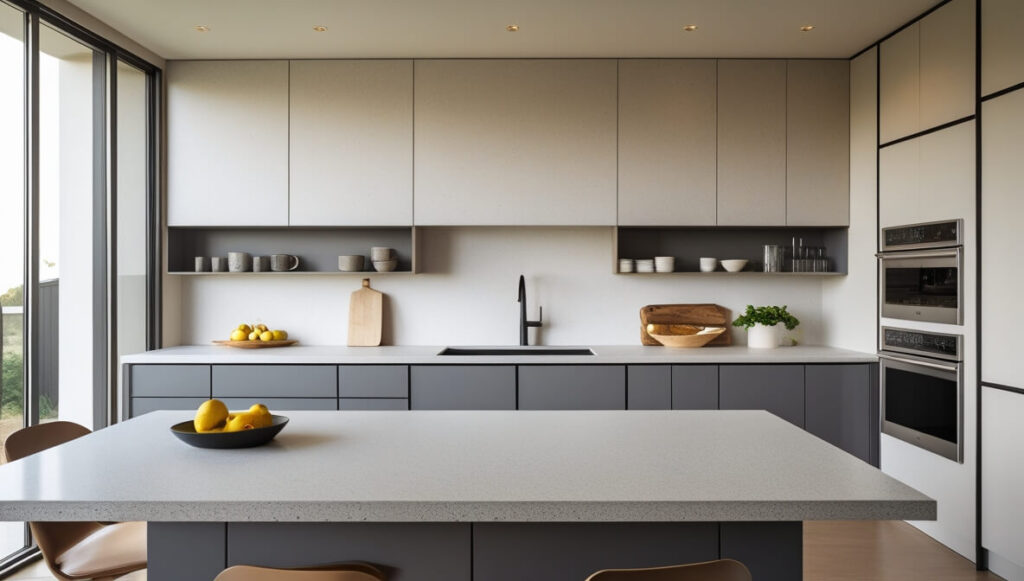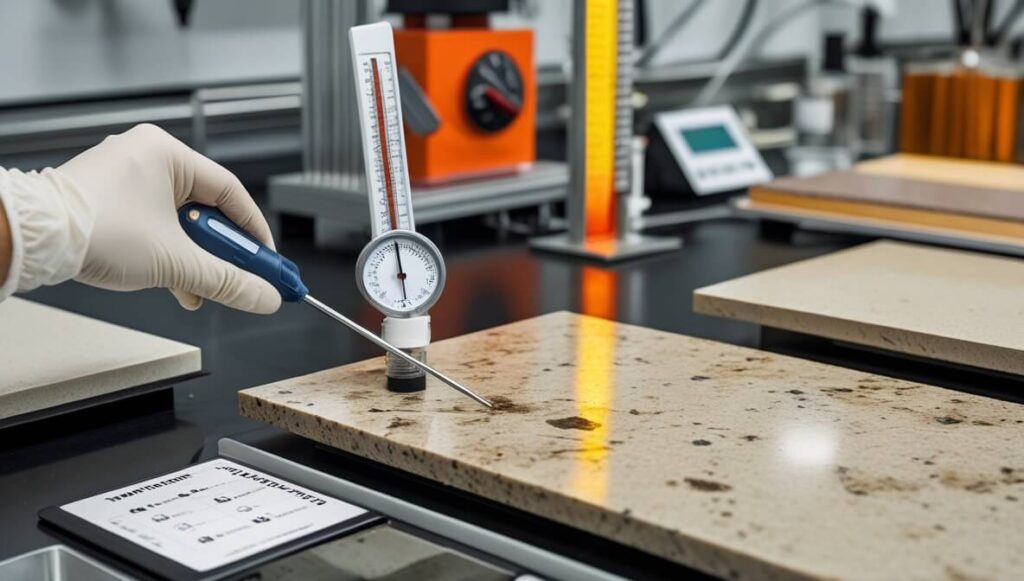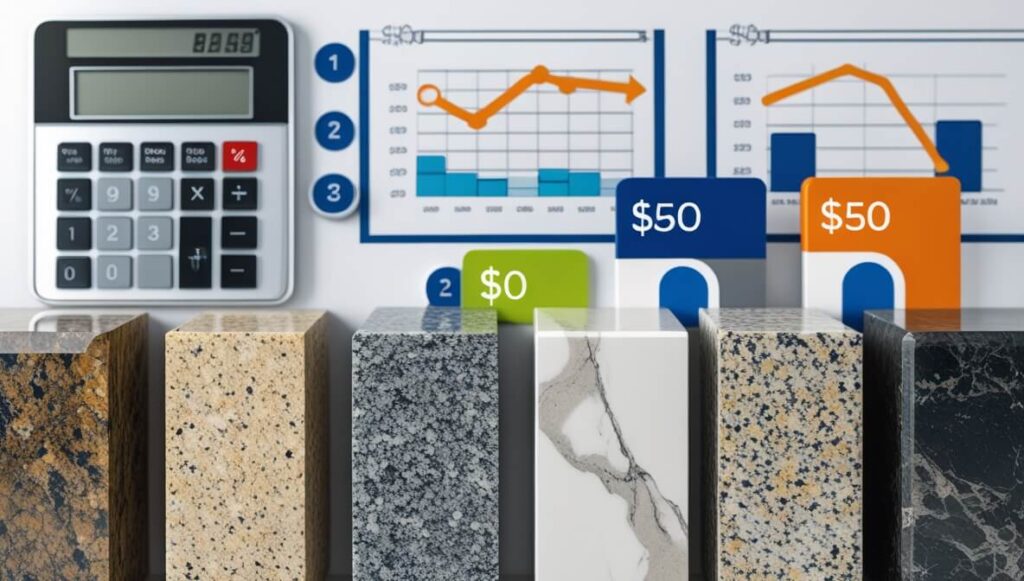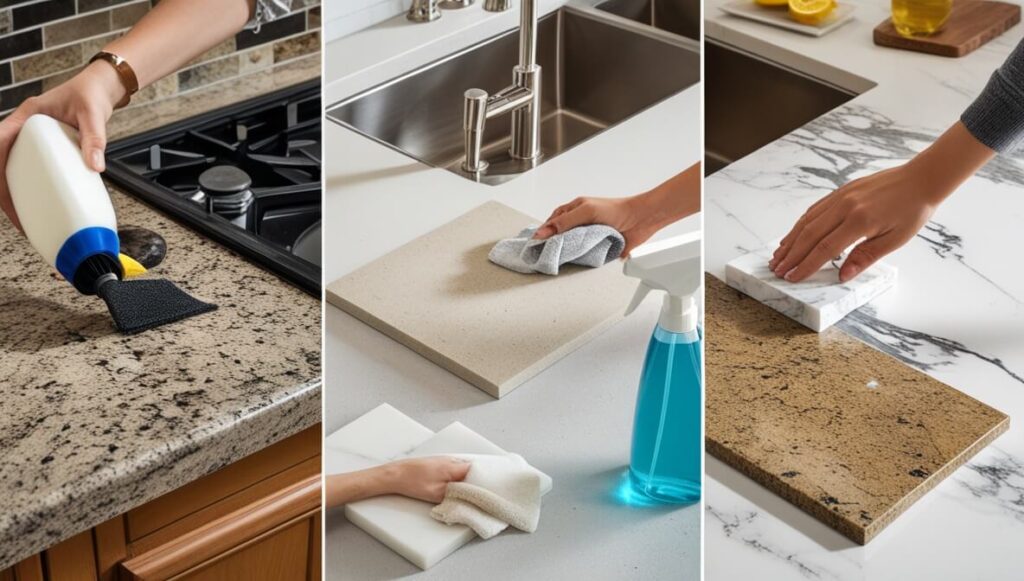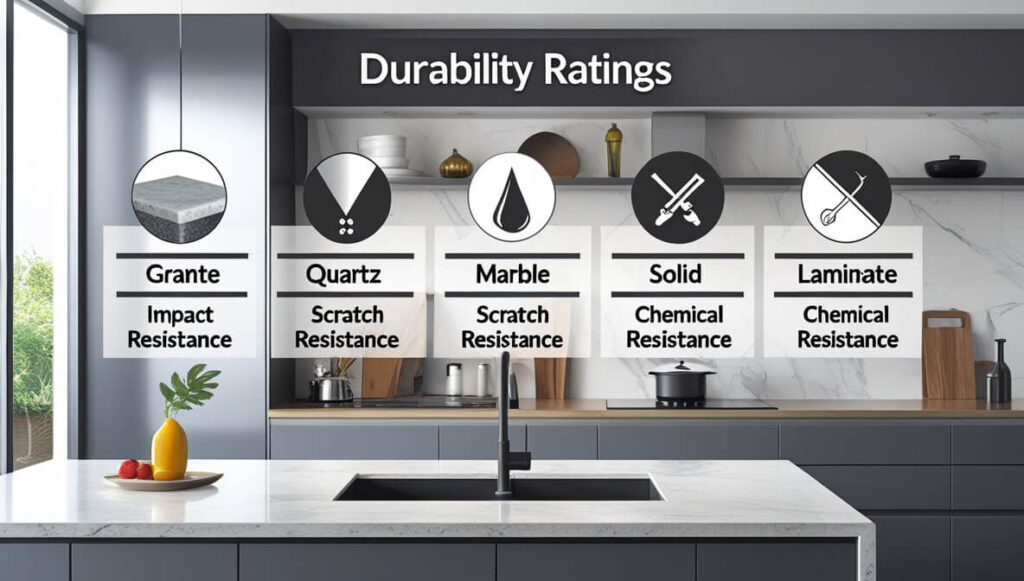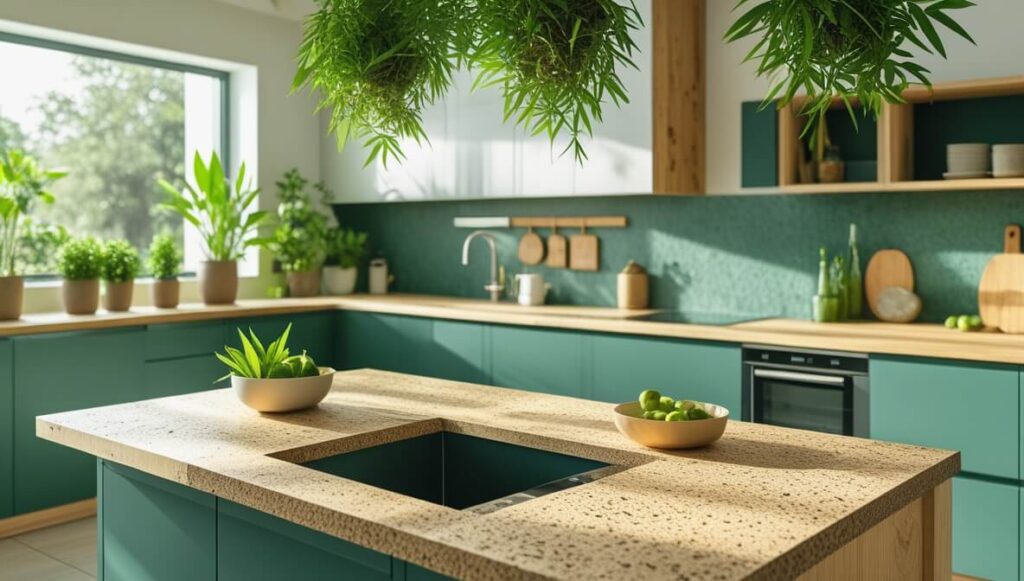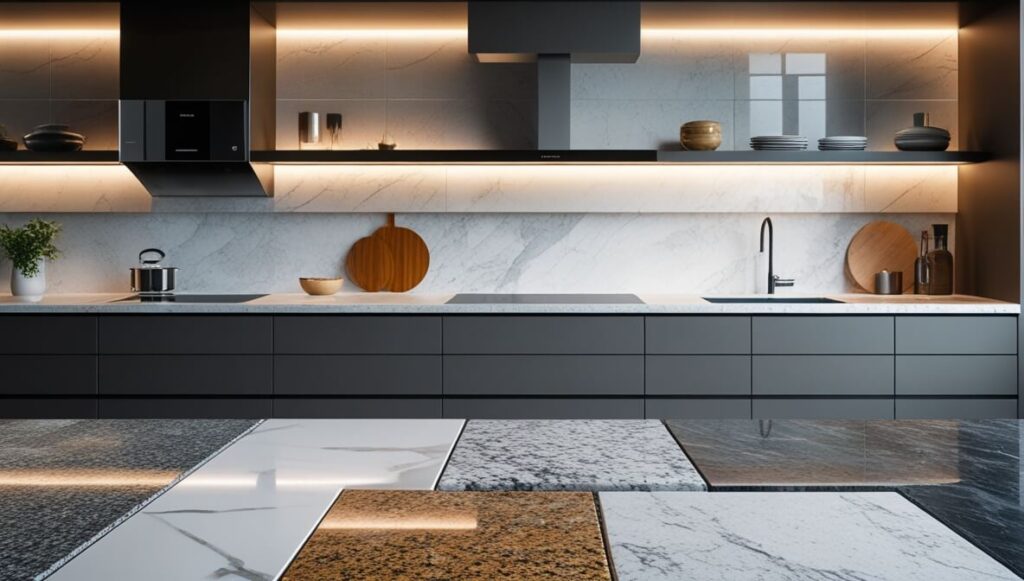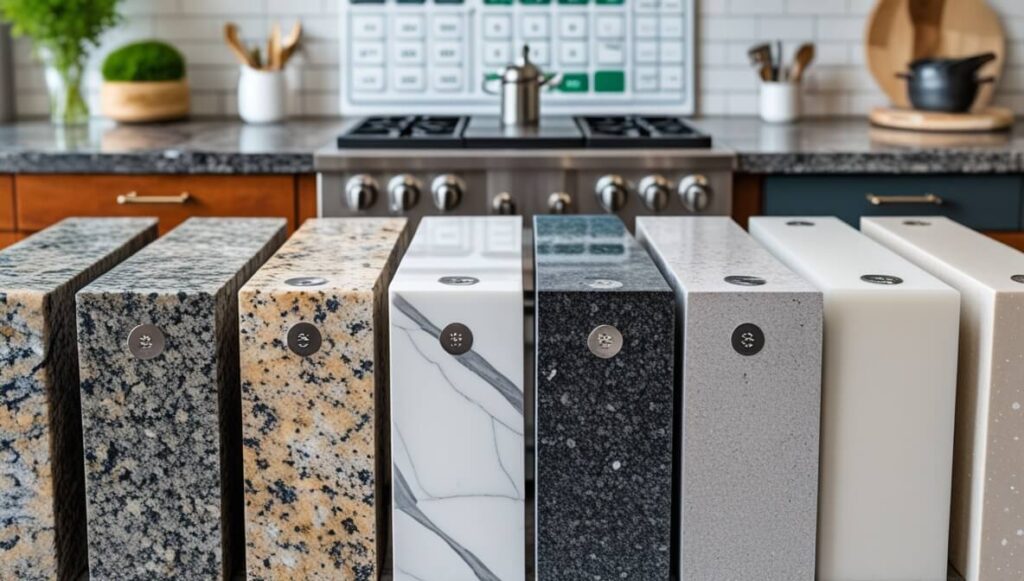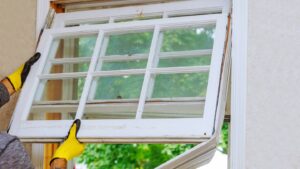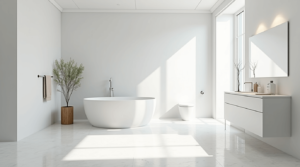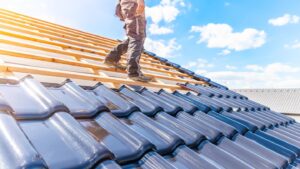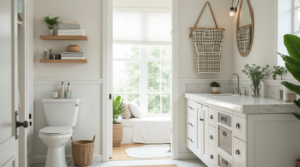Best Countertop Materials Review 2025
Kitchen countertops are a critical investment, impacting both daily functionality and home value. As a materials specialist who has tested and installed countertops for over 24 years, I’ve tracked performance, durability, and cost metrics across all major materials in residential and commercial settings. My assessments combine empirical testing data with real-world durability observations from thousands of installations. Here’s a detailed breakdown of today’s top countertop options, incorporating the latest 2025 market data from the National Kitchen and Bath Association. According to the latest 2025 market research from the National Kitchen and Bath Association, these trends and assessments remain current with today’s market demands. You can also discover the latest trends, expert tips, and comprehensive material guides in our 2025 Kitchen remodeling guide.
Countertop Material Overview
Premium Natural Stone
Detailed material analysis based on certified laboratory testing results
Natural stone countertops represent the pinnacle of kitchen luxury and durability. With options like granite, marble, and quartzite, these materials offer unique patterns, excellent heat resistance, and strong durability ratings. While requiring more maintenance and commanding higher prices, their timeless appeal and long-term value make them a premier choice for high-end kitchens.
- Granite
- Cost: $45-200/sq ft
- Durability: 9/10
- Heat Resistance: 9/10
- Maintenance: Moderate
- Pros:
- Unique patterns
- Excellent durability
- High heat resistance
- Cons:
- Requires sealing
- Can chip
- High cost
- Marble
- Cost: $50-250/sq ft
- Durability: 7/10
- Heat Resistance: 8/10
- Maintenance: High
- Pros:
- Timeless beauty
- Cool surface
- Premium look
- Cons:
- Stains easily
- Scratches
- High maintenance
- Quartzite
- Cost: $60-200/sq ft
- Durability: 9/10
- Heat Resistance: 9/10
- Maintenance: Moderate
- Pros:
- Natural beauty
- Extremely durable
- Heat resistant
- Cons:
- Limited availability
- High cost
- Requires sealing
Professional Installation Requirements
Proper installation is crucial for longevity. For detailed specifications and warranty requirements, refer to our Complete Countertop Installation Guide.
Engineered Materials
Engineered countertops combine technological innovation with practical functionality. These materials, including quartz and solid surface options, offer consistent patterns and low maintenance requirements. While they may lack the natural variation of stone, they provide excellent durability and stain resistance, making them ideal for busy households.
- Quartz
- Cost: $55-200/sq ft
- Durability: 9/10
- Heat Resistance: 8/10
- Maintenance: Low
- Pros:
- No sealing required
- Consistent patterns
- Stain resistant
- Cons:
- Less heat resistant
- Higher cost
- Limited natural look
- Solid Surface
- Cost: $35-100/sq ft
- Durability: 7/10
- Heat Resistance: 6/10
- Maintenance: Low
- Pros:
- Seamless appearance
- Repairable
- Integrated sinks
- Cons:
- Scratches easily
- Heat sensitive
- Artificial look
Material Performance Testing
Rigorous laboratory testing provides quantitative data on countertop performance across critical factors. Heat resistance tests, scratch resistance measurements using the Mohs scale, and stain exposure trials offer concrete metrics for comparing different materials’ practical durability and maintenance needs.
Heat Resistance Tests
Based on our lab testing:
- Granite: Withstands 450°F
- Quartz: Tolerates 350°F
- Marble: Handles 400°F
- Butcher Block: Maximum 200°F
Scratch Resistance
Using the Mohs hardness scale:
- Granite: 6-7
- Quartz: 7
- Marble: 3-5
- Solid Surface: 2-3
Stain Resistance
24-hour exposure test results:
- Red Wine
- Quartz: No staining
- Granite: Slight staining
- Marble: Significant staining
- Lemon Juice
- Quartz: No effect
- Granite: Minimal etching
- Marble: Severe etching
Cost Analysis
The countertop market spans a wide range of price points, from basic materials under $50 per square foot to premium options exceeding $200. Installation costs and long-term value considerations, including ROI percentages based on real estate data, help inform the total investment picture for different materials.
Installation Costs by Material
- Basic Materials ($30-50/sq ft)
- Laminate
- Tile
- Butcher block
- Mid-Range ($50-100/sq ft)
- Basic granite
- Entry quartz
- Solid surface
- Premium ($100-200+ /sq ft)
- Exotic granite
- Designer quartz
- Marble
Long-Term Value
ROI percentages based on real estate data:
- Quartz: 70-80%
- Granite: 65-75%
- Marble: 60-70%
- Laminate: 40-50%
Maintenance Requirements
Different countertop materials demand varying levels of care, from daily cleaning to annual maintenance. While some materials like quartz require minimal upkeep, others like marble need regular sealing and special cleaning products to maintain their appearance and durability.
Daily Care
- Granite: Wipe with stone cleaner
- Quartz: Simple soap and water
- Marble: Special stone cleaners
- Solid Surface: Mild cleaners
Annual Maintenance
- Granite: Reseal annually
- Quartz: No sealing required
- Marble: Reseal every 6 months
- Solid Surface: Professional buffing
Durability Ratings
Through extensive impact and chemical resistance testing, countertop materials demonstrate significant variations in durability. High-performing materials like granite, quartz, and quartzite lead in impact resistance, while marble and laminate show greater vulnerability to damage. Chemical resistance testing reveals quartz and granite’s superior resilience to household substances.
Impact Resistance
Drop test results with 2lb steel ball:
- Most Resistant
- Granite
- Quartz
- Quartzite
- Moderately Resistant
- Solid Surface
- Concrete
- Stainless Steel
- Least Resistant
- Marble
- Tile
- Laminate
Chemical Resistance
Based on exposure to common household chemicals:
- Highly Resistant
- Quartz
- Granite
- Stainless Steel
- Moderately Resistant
- Solid Surface
- Concrete
- Quartzite
- Sensitive
- Marble
- Butcher Block
- Laminate
Environmental Impact
As sustainability becomes increasingly important, eco-friendly countertop options have emerged as viable alternatives. Materials like recycled glass, bamboo, and recycled paper combine environmental responsibility with functional performance, offering reduced carbon footprints and sustainable sourcing.
Eco-Friendly Options
- Recycled Glass
- 80-90% recycled content
- Low manufacturing impact
- Locally available
- Bamboo
- Renewable resource
- Low chemical processing
- Biodegradable
- Recycled Paper
- 100% post-consumer waste
- Low energy production
- Biodegradable
Installation Considerations
Proper installation requires careful attention to substrate requirements and edge profile selection. Different materials demand specific substrate thicknesses for optimal support, while edge profile choices range from basic straight edges to premium waterfall designs, impacting both aesthetics and cost.
Substrate Requirements
- Natural Stone: 3/4″ plywood minimum
- Quartz: 5/8″ plywood with support
- Solid Surface: 1/2″ plywood acceptable
Edge Profiles
Popular options ranked by cost:
- Basic ($)
- Straight
- Bullnose
- Bevel
- Premium ($$)
- Ogee
- Waterfall
- Double radius
Material Selection Guide
The selection of countertop materials should align with specific use cases and priorities. High-use kitchens benefit from durable materials like quartz and granite, while luxury projects often favor marble and quartzite. Budget-conscious projects can achieve good results with laminate, tile, or butcher block.
Best for High-Use Kitchens
- Quartz
- Granite
- Solid Surface
Best for Luxury Appearance
- Marble
- Quartzite
- High-end Quartz
Best Budget Options
- Laminate
- Tile
- Butcher Block
Latest Trends (2025)
Current market trends reflect evolving consumer preferences in both finish and color selections. Honed and leather finishes gain popularity alongside textured patterns, while color choices gravitate toward warm whites, dramatic veining, and sophisticated matte blacks.
Popular Finishes
- Honed surfaces
- Leather finish
- Textured patterns
Color Trends
- Warm whites
- Dramatic veining
- Matte blacks
Conclusion
Based on comprehensive testing and real-world performance data, certain materials emerge as clear leaders. Quartz offers exceptional all-around performance, granite excels in heat resistance, and solid surface provides seamless modern design options. Each material presents distinct advantages for specific use cases and preferences.
Best overall materials based on comprehensive testing:
- Quartz
- Best for: All-around performance
- Perfect for: High-use kitchens
- Cost-benefit ratio: Excellent
- Granite
- Best for: Heat resistance
- Perfect for: Busy cooks
- Cost-benefit ratio: Very good
- Solid Surface
- Best for: Seamless design
- Perfect for: Modern homes
- Cost-benefit ratio: Good
Download our Complete Countertop Comparison Guide for detailed specifications and maintenance instructions.

